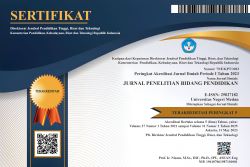MASALAH DAN TANTANGAN YANG DIHADAPI SELAMA PANDEMI COVID-19 PADA MAHASISWA EFL UNIVERSITAS MITRA KARYA
Abstract
Penelitian ini bertujuan untuk menggali masalah dan tantangan yang dihadapi Mahasiswa EFL selama pandemic COVID-19. Metode survei online diikuti mahasiswa sebanyak 100 dengan menggunakan Kuesioner. Hasil penelitian ini menjelaskan bahwa Mahasiswa Universitas Mitra Karya mengalami tingkat kesulitan sedang hingga tinggi dalam semua keterampilan terutama dalam Listening karena fasilitas yang terbatas. Analisis dari hasil penemuan ini mengungkapkan bahwa sebagian besar Mahasiswa mengalami masalah dalam Listening sebagian besar waktu selama kelas online kadang-kadang karena hambatan fisik dan terkadang hambatan lainnya. Diskusi dan implikasi dari temuan ini disajikan.
Keywords
Full Text:
PDFReferences
Bahk, E.-J. (17 March 2020). Colleges poorly prepared for online lectures. The Korea Times. https://www.koreatimes.co.kr/www/nation/2020/03/ 181_286316.html
Byun, S. & Slavin, R. E. (2020). Educational Responses to the COVID-19 Outbreak in South Korea. Best Evid Chin Edu, 5(2), 665-680.
Cao, W., Fang, Z., Hou, G., Han, M., Xu, X., Dong, J., &Zheng, J. (2020). The Psychological Impactofthe COVID-19 Epidemicon College Students in China. Psychiatry Research, 287, 1–5.
Coffield, F. (2008). Just suppose teaching and learning became the first priority. Learning and Skills Network
Coiro, J., Knobel, M., Lankshear & Leu, D. (2008). Handbook of research on new literacies. New York: Laurence Erlbaum.
Cole, M., & Werstch, J. (1996). Beyond the Individual-Social Antimony in Discussions of Piaget and Vygotsky. University of California San Diego USA.
Creswell, J. W. (2012). Research Design: Qualitative, Quantitative and Mixed Methods Approaches, (4thedition), California: Sage Publications.
Dabbagh, N. & Bannan-Ritland, B. (2005). Online learning: Concept, strategies, and application. New Jersey: Pearson education, Inc.
Engeström, Y. (1987). Learning by Expanding. An activity theoretical approach to developmental research. Orienta konsultit.
Kristanto, I. (2020). Penyakit Covid-19. Kompaspedia.
Maudiati, Santi. (2018). Penerapan E-Learning di Perguruan Tinggi. PERSPEKTIF Ilmu Pendidikan - Vol. 32 No. 1 April 2018
Mwanza, Daisy, & Engeström, Y. (2005). "Managing Content in e-Learning Environments. British Journal of Educational Technology, 36(3), 453-463.
Noviarini, T. (2021). Dampak Pandemi Covid-19 Terhadap Sikap Pembelajaran Bahasa Pada Mahasiswa Universitas Mitra Karya Bekasi. Jurnal Ilmiah Wahana Pendidikan, 7(1), 75. https://doi.org/10.5281/zenodo.4444307
Pellegrini, M., Uskov, V., & Casalino, N. (2020). Reimagining and Re-Designing the Post-COVID-19 Higher Education Organizations to Address New Challenges and Responses for Safenand Effective Teaching Activities. Law and Economics Yearly Review Journal, 219-248. Available at: https://papers.ssrn.com/sol3/papers.cfm?abstract_id=3659062
Prensky, M. (2001). Digital natives, digital immigrants. From On the Horizon. MCB University Press, 9(5), 1-6.
Vai, M., & Sosulski, K. (2015). Essentials of online course design: A standards-based guide. New York, NY: Routledge.
Vygotsky, L. (1978). Mind in society: The Development of Higher Psychological Processes. Cambridge: Harvard University Press.
White, C. (2008). Innovation and Identity in Distance Language Learning and Teaching. Innovation in Language Learning and Teaching, 1(1), 97–110.
DOI: https://doi.org/10.24114/jpbp.v27i2.23415
Article Metrics
Abstract view : 255 timesPDF - 358 times
Refbacks
- There are currently no refbacks.
Copyright (c) 2021 JURNAL PENELITIAN BIDANG PENDIDIKAN

This work is licensed under a Creative Commons Attribution 4.0 International License.
